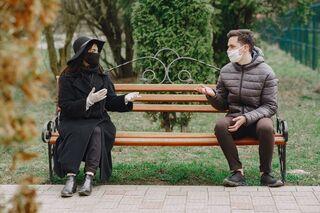A self-fulfilling prophecy is a process by which expectations elicit behaviors that ultimately confirm those expectations. For instance, many psychologists discuss how stock market trading can be influenced by a self-fulfilling prophecy. When individuals believe the stock market is going to rise, they buy, and the stock market does rise; when people believe the market is going to fall, they sell, and the market does fall.
The COVID-19 pandemic may demonstrate many more examples of the self-fulfilling prophecy. For example, many individuals believe there’s nothing that can be done to prevent the spread of the virus and that everyone’s going to become infected at some point no matter what. Such people may argue that lockdowns, social distancing, and masks don’t make any significant difference, and this may lead them to argue for re-opening, go to bars, and not wear masks. And, when enough individuals demonstrate this pattern, the virus does spread, as it has in many regions of the United States.
How will similar self-fulfilling prophecies impact what happens this academic year as elementary, secondary, and post-secondary students return to school? Some say that elementary school children can’t possibly wear masks during an entire school day. Many argue that middle-school and high-school kids can’t possibly control their bodies and remain physically distant from their peers. Others are convinced that college and university students will, of course, go to bars and party. Across these levels of school, many believe that the quality of education will definitely be lacking. We may be in for a very difficult fall and winter if these are the assumptions that guide us.
There actually is a great deal of controversy and debate among researchers who study the self-fulfilling prophecy: maybe self-fulfilling prophecies elicit certain outcomes because people’s expectations are accurate in the first place. For instance, it’s true that students experience certain struggles conforming to public health guidelines because of developmental needs and that following these guidelines is particularly difficult for some due to various underlying conditions. There definitely are unique obstacles for education during a pandemic.
This raises a key question about people’s mindsets, with potentially critical consequences for this pandemic: do we emphasize limitations and obstacles in our thinking and assume that behavior cannot change, or do we emphasize possibilities and assume that behavior can change through effort, persistence, and accurate information? In some ways, the answer surely depends on the individual and situation. We need to be real. At the same time, what if we lean optimistic this academic year and assume that young people are capable of social responsibility and that schools can be a spark for transformation?

Pexels | Gustavo Fring
For example, what if we generally expect the best of students, believing they could possibly learn to socially distance, wear masks, and show concern for the most vulnerable? Parents might have different conversations with their kids, better preparing them for the unique challenges of this school year. Teachers might have higher expectations and show more follow through with those expectations. Colleges and universities may enforce stringent consequences when students don’t follow community policies.
What if we expect schools to adapt and experiment with curricula to address the unique concerns and questions of this time? What if every teacher in some way used their classroom to appropriately address the pandemic? Students could be challenged to think critically about how they know what they know and taught to see the relevance of reliable sources of information. Science teachers could discuss the process of drawing public health conclusions from clinical trials. Social studies and humanities teachers, as well as counselors and advisors, could discuss the human experience during times of tragedy, mental health struggles, and resilience. This knowledge could make a significant difference, not only for students, but also for family members and friends in students’ lives as well.
This kind of adaptation requires parents, teachers, and students to be at their best, a difficult charge when emotional distress is three times higher than previous years and happiness is at a near 50-year-low. Individuals need every possible kind of support if we are to do this. It’s not going to be easy.
And, yet, the honest truth is that no one is going to save us from the immediate problems of this pandemic but ourselves. For a time such as this, let’s rise to the occasion.
This post was first published at: http://www.psychologytoday.com.
